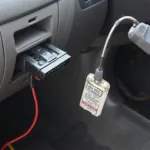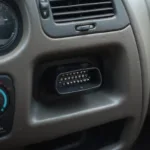Reading OBD1 codes with an OBD2 scanner isn’t a straightforward plug-and-play process. OBD1 and OBD2 systems are fundamentally different, using distinct communication protocols, connectors, and code formats. While a standard OBD2 scanner won’t directly interpret OBD1 codes, there are workarounds and alternative methods for retrieving diagnostic information from older vehicles.
Understanding the key differences between OBD1 and OBD2 is crucial for effectively diagnosing older vehicles. OBD1 systems, prevalent in vehicles manufactured before 1996, employed manufacturer-specific protocols and connectors. This means that each carmaker had its own unique way of reporting diagnostic trouble codes (DTCs). In contrast, OBD2 standardized these aspects, ensuring compatibility across different makes and models. This standardization is why a single obd2 a scanner can be used on a wide range of vehicles.
Decoding OBD1: Bridging the Gap
So, how do you extract those OBD1 codes? Several options exist, each with its own advantages and disadvantages:
-
OBD1 Code Readers: These specialized tools are designed specifically for retrieving codes from OBD1 systems. They often feature manufacturer-specific functionalities and can provide more detailed diagnostic information than generic solutions.
-
Adapters: OBD1 to OBD2 adapters can be used to connect a standard OBD2 scanner to an OBD1 system. However, the effectiveness of this method depends heavily on the adapter’s quality and compatibility with the specific vehicle. Some adapters may require additional software or may not function correctly with all OBD2 scanners.
-
DIY Methods: For some vehicles, OBD1 codes can be retrieved through manual methods such as counting flashes of the check engine light or using jumper wires to access diagnostic modes. These methods require specific knowledge of the vehicle’s system and may not be suitable for all models.
Can You Use a Regular OBD2 Scanner for OBD1 Codes?
No, a regular OBD2 scanner cannot directly read OBD1 codes. The communication protocols are entirely different. Imagine trying to translate French into Japanese using a Spanish dictionary. The languages are simply incompatible. Similarly, an OBD2 scanner is designed to interpret the standardized language of OBD2, not the manufacturer-specific dialects of OBD1.
Why the Incompatibility?
The shift from OBD1 to OBD2 marked a significant evolution in automotive diagnostics. OBD2 introduced standardized protocols, allowing for more comprehensive and consistent diagnostic information. This standardization is why a single honda obd2 bluetooth adapter can often connect to multiple car brands from 1996 onwards.
Choosing the Right Approach for Reading OBD1 Codes
Selecting the most appropriate method depends on several factors, including your budget, technical skills, and the specific make and model of your vehicle.
-
Professional Diagnostics: For complex issues or if you’re uncomfortable working with automotive electronics, taking your vehicle to a qualified mechanic is often the best option. They have the expertise and specialized tools to accurately diagnose and repair any problems.
-
DIY Diagnostics: If you’re technically inclined and enjoy working on your own car, using an OBD1 code reader or adapter can be a cost-effective solution. Researching 1996 2003 obd2 gm 1996-2003 obd2 may be helpful even if your car is OBD1, as it highlights the progression in diagnostic technology.
“OBD1 systems are like vintage cars – they require a specialized approach. Don’t expect a modern tool to understand a classic language,” says automotive diagnostics expert, David Miller.
In conclusion, reading OBD1 codes with an OBD2 scanner is not directly possible due to fundamental differences in the systems. However, alternative methods like dedicated OBD1 code readers, adapters, and manual techniques can be used to retrieve diagnostic information from older vehicles. Choosing the right approach depends on your individual needs and resources. Understanding these differences is crucial for anyone working with older vehicles. Reading OBD1 codes requires a specific strategy, not just a generic OBD2 scanner.
Frequently Asked Questions:
- What is the difference between OBD1 and OBD2?
- Can I use any OBD2 scanner with an adapter?
- Where can I find an OBD1 code reader for my car?
- Are there any risks associated with using an adapter?
- What should I do if I can’t read the codes myself?
- Is it worth investing in an OBD1 code reader?
- How can I learn more about my car’s specific OBD1 system?
For more assistance, contact us via WhatsApp: +1(641)206-8880, Email: [email protected] or visit us at 789 Elm Street, San Francisco, CA 94102, USA. Our customer service team is available 24/7. We also offer resources on converting analog to obd2 and bosch obd2 scanner code reset if those topics are relevant to your needs.


